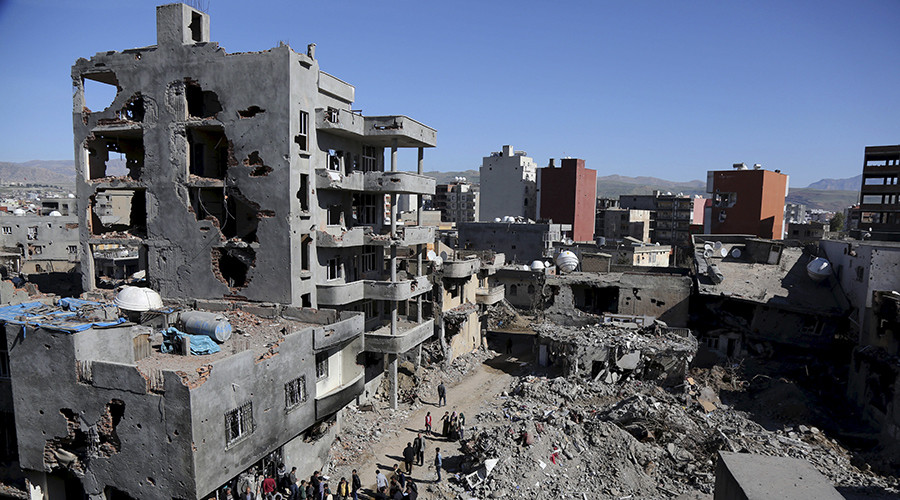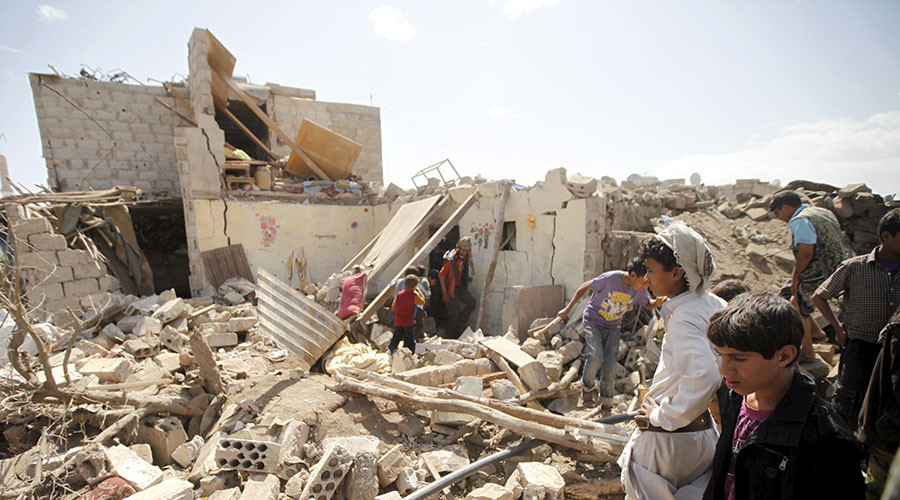Gulf states under fire for not accepting Syrian refugees
 |
| A man carries children through a bombed-out city in Syria. |
© AFP |
Text by Khatya CHHOR
Gulf states are under fire from human rights groups for not doing more for Syrian refugees as Syria’s neighbours struggle to house those fleeing across their borders and the EU grapples with its worst refugee crisis since World War II.
The UN estimates that more than 4 million Syrians have fled the country’s civil conflict so far, with 3.8 million of these having temporarily sought refuge in just five countries: Turkey, Lebanon, Jordan, Iraq (mainly Kurdistan) and Egypt.
According to the UN High Commission for Refugees (UNHCR),
Turkey has taken in almost 2 million Syrian refugees while Lebanon has registered 1.1 million refugees within its borders – an influx that now accounts for 20 percent of the Lebanese population. Jordan, likewise, has received almost 630,000 asylum-seekers, Iraq close to 250,000 and Egypt another 132,000. Many other Syrians have crossed into these countries but have not been officially counted.
But while Syria’s neighbours struggle to accommodate the influx,
an Amnesty International report from December noted that the six Gulf states — Bahrain, the United Arab Emirates, Saudi Arabia, Kuwait and Qatar — “have offered zero resettlement places to Syrian refugees”.
The executive director of Human Rights Watch, Kenneth Roth, underscored this point in a blunt tweet last week:
“They're wealthy, Muslim and not taking ANY Syrian refugees: Saudi Arabia & other Gulf states,” he wrote on Twitter.
The Gulf states do provide significant financial help to those affected by the conflict. The United Arab Emirates has donated more than $540 million in humanitarian assistance and funded a refugee camp in Jordan as well as another in northern Iraq, a UAE government official told Bloomberg.
Saudi Arabia has donated $18.4 million to the Syria fund of the UN Office for the Coordination of Humanitarian Affairs so far this year while Kuwait has given almost $305 million, making it the third-largest international donor behind the United States (at $1 billion) and the United Kingdom ($475 million).
“If it wasn’t for the Gulf states, you would expect these millions to be in a much more tragic state than they are,” Abdulkhaleq Abdulla, a political science professor in the United Arab Emirates, told The New York Times. “This finger-pointing at the Gulf that they are not doing anything, it is just not true.”
But critics note that the Gulf states' aid does not involve opening up their borders to help deal with the crisis.
“Burden sharing has no meaning in the Gulf, and the Saudi, Emirati and Qatari approach has been to sign a check and let everyone else deal with it,” Sarah Leah Whitson, executive director of Human Rights Watch for its Middle East and North Africa division, told the Times. “Now everyone else is saying, ‘That’s not fair.’ ”
'Shameful'
Nabil Othman, acting regional representative to the Gulf region at the UNHCR, told Bloomberg last week that there are currently 500,000 Syrians in Saudi Arabia. But many of these may have entered the country before or in the early days of the Syrian conflict as migrant workers.
The UN refugee agency’s own figures as of December 2014 put the number of international refugees welcomed by the kingdom at 561 along with another 100 asylum-seekers; it did not specify how many of these were Syrians.
"The bottom line is that in terms of resettlement, the Gulf states have not stepped up in accepting refugees," said Geoffrey Mock, chairman of Middle East specialists at Amnesty International USA. "They have offered zero resettlement places ... and this is shameful," he told USA Today.
A CARTOON BY SAUDI ARTIST ABDULLAH JABER FOR MAKKAH NEWSPAPER SATIRIZES THE GULF STATES' RESPONSE
 |
| "Shame on you EU, open your doors" |
Some analysts point out that not only is Saudi Arabia wealthy enough to accommodate a significant number of refugees, but it also has the logistical capability to do so: Each year the kingdom receives an influx of millions for the Hajj pilgrimage to Mecca. And the construction companies that have built the mega malls and opulent skyscrapers of Dubai, Abu Dhabi and Riyadh could be contracted to create temporary shelters, said one Quartz commentator, adding: “There’s no reason all this know-how can’t be put to humanitarian use.”
More welcome in Europe?
Syrians are required to obtain visas to enter all Arab countries except for Algeria, Mauritania, Sudan and Yemen. The process for requesting a tourist or work visa is expensive, and Gulf states have cracked down on the number of foreign work permits they grant in recent years.
Many have taken to social media to urge the Gulf states to do more for those who need asylum. The Arabic hashtag #Welcoming_Syria's_refugees_is_a_Gulf_duty has been tweeted more than 33,000 times in the past week, the BBC reports.
Two other hashtags in Arabic – “Open your doors” and “Welcoming Syrian refugees is the people’s demand” – are also making the rounds on Twitter. These were created the same day that the image of a Syrian toddler who washed up on a beach in Turkey made headlines across Europe, bringing home to many the human tragedy of a conflict that once seemed far away.
Domestic social and security considerations have underpinned some of the Gulf states' hesitation to allow large numbers of refugees to cross their borders. Concerns have been raised about newcomers taking jobs from locals or that jihadists might enter the country posing as asylum-seekers.
Astonishing!
"Saudi Arabia stopped issuing work permits to Syrian nationals at the beginning of the war in 2011," said Stéphane Lacroix, a researcher specialising in the Arab world at the Centre for International Research at SciencesPo university, in comments to FRANCE 24.
Lacroix said the response – or lack thereof – by authorities in Riyadh has been largely motivated by concerns over its own political stability.
As a Sunni monarchy, it cannot help but support the Sunni Syrian rebellion, he said. But
Saudi Arabia also fears that "by welcoming outsiders it will, at the same time, import new ideas and new rhetoric that will contaminate Saudi society”.
Even more astonishing! Germany and Sweden have not asked themselves any of those questions, or addressed any of those concerns. Arabs use them as excuses to keep out other Arabs, almost all of whom are Muslim, while Germany and Sweden whose societies are already beginning to collapse under the weight of Islamic immigrants, don't seem to care about the consequences.
The irony is astounding! The stupidity of some of those European countries will precipitate the complete collapse of European societies bringing Sharia law much closer to reality than it was just last week.
The unique demographics of some Gulf states also make the authorities hesitant to allow in vast new numbers of foreign nationals, wrote Michael Stephens, head of the Royal United Services Institute Qatar research centre, in a contribution to the BBC.
UAE and Qatari citizens account for just over 10% of their respective populations; the vast majority of residents are temporary foreign workers.
And many refugees themselves express a desire to make the journey to Europe instead of opting for resettling in Arab states.
“In Europe, I can get treatment for my polio, educate my children, have shelter and live an honourable life,” said asylum-seeker Yassir Batal in comments to Bloomberg. “Gulf countries have closed their doors in the face of Syrians.”
The EU is now struggling with its own migrant crisis, with an estimated 330,000 asylum seekers entering Europe so far this year. But as Amnesty International points out, the number of Syrian refugees in Turkey alone is more than 10 times the number of asylum applications received from Syrians by all 28 EU countries in the past three years combined.
Over 100,000 air-conditioned tents empty
Meanwhile, there are reports that there are over 100,000 air-conditioned tents in Saudi Arabia sitting empty. These tents were erected for the Hajj which starts next week. The Hajj is that insane circling of hundreds of thousands of people in the mosque at Mecca.
Saudi Press Agency also claims that the Kingdom has accepted 2.5 million Syrians since the conflict began, but because they don't label them as refugees, some reporters claim that they have not taken any. Also, Saudi Arabia, as well as other Gulf States have given many millions of dollars to other countries and agencies to assist with caring for the refugees.
 |
Saudi Arabia – which has taken in precisely zero migrants – has 100,000
air conditioned tents that can house over 3 million people sitting empty. |
So that's the story, whether you believe the Saudi Press or whether you believe Amnesty Int'l and Human Rights Watch, is up to you.



















